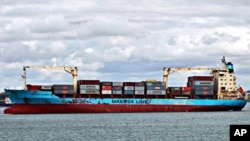A federal judge in New York has sentenced Somali pirate Abduwali Muse to 33 years and nine months in prison for hijacking a container ship in the Indian Ocean, taking the captain hostage, and for his role in two earlier ship hijackings.
Abduwali Abdiqadir Muse was sentenced to nearly 34 years in prison in an emotional hearing that included testimony from a survivor of the 2009 hijacking of the Maersk Alabama, an American-flagged container ship, off the coast of Somalia.
Muse’s lawyers had sought the minimum, more lenient sentence of 27 years. But U.S. District Judge Loretta Preska, saying Muse and his accomplices appeared to "relish their most depraved acts of physical and psychological violence," said a longer sentence was needed to deter other pirates.
Following takeovers of two other ships, Muse and three accomplices climbed aboard the Maersk Alabama on April 8, 2009. Muse, whom prosecutors said was the leader, allegedly fired an AK-47 assault rifle at the captain, Richard Phillips, and ordered him to stop the ship. Days later, Muse was captured, and U.S. Navy snipers shot and killed his three accomplices, rescuing Phillips. Colin Wright, who had been third officer on the ship and spoke at the hearing, later told reporters that the sentence was not too harsh.
"Seems like a very short time for the pain and trauma that he and his companions have caused," said Wright. "He’s also responsible for his three companions being killed. And a sentence of 33, nearly 34 years, seems like a fairly short one for that."
Muse had pleaded guilty in May to six counts related to hijacking maritime vessels, kidnapping and hostage-taking. Prior to his sentencing, Muse told the court through a translator that he was "very sorry," and asked forgiveness from those he had harmed. Muse’s attorneys contended that extreme poverty led him to piracy, and that he was still in his mid-teens. However, the court found that Muse was over 18 at the time of the hijackings.
Colin Wright said he has returned to his work as a sailor, but still does not feel safe. He said U.S.-flagged ships need to be armed.
"We need some protection aboard our vessels and having armed security is very good, if they would put armed security on every ship," he said. "But if they’re not going to allow armed security, I think we should be able to protect ourselves with small arms."
U.S. Attorney for the Southern District of New York Preet Bharara said in a statement that the sentence makes clear that piracy on the high seas is a crime against the international community that will not be tolerated.
But despite international naval patrols, pirates continue to operate in the waters off Somalia, and have been tried or are facing trial in several other countries including Germany, South Korea, Malaysia and India. In 2010, a U.S. court in the state of Virginia found five Somali men guilty of firing at a U.S. Navy ship off the coast of Africa.
Somali Pirate Sentenced to Nearly 34 Years in US Prison












